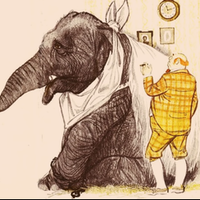I
mən
I
I
I
I
I
I
I
Маленькая девочка Надя нездорова.
|||est malade
little|girl|Nadia|is unwell
||Nadia|è malata
|||está enferma
|||är sjuk
The little girl is unwell.
La petite fille Nadia ne va pas bien.
Mała Nadia nie czuje się dobrze.
Каждый день к ней ходит доктор Михаил Петрович, которого она знает уже давным -давно.
||||||||||||long|depuis longtemps
every|||to her|goes|the doctor|Mikhail|Doctor (Mikhail) Petrovich|whom||||for a long time|for a long time
|||a lei|va|||Pietrović|che|||già|da molto|da molto tempo
||||||||||||hace mucho|
Every day, Doctor Mikhail Petrovich visits her, whom she has known for a long time.
Chaque jour, elle reçoit la visite du docteur Mikhail Petrovich, qu'elle connaît depuis longtemps.
Codziennie odwiedza ją dr Michaił Pietrowicz, którego zna od dawna.
А иногда он приводит с собою ещё двух докторов, незнакомых.
|||amène||avec lui||||
|sometimes|he|brings||with himself|also|two|doctors|unfamiliar
|a volte||porta||con sé|anche|due|dei dottori|sconosciuti
And sometimes he brings along two other doctors, whom she doesn't know.
Parfois, il est accompagné de deux autres médecins, des étrangers.
Czasami zabiera ze sobą jeszcze dwóch nieznajomych lekarzy.
Они осматривают девочку.
|examinent|
|are examining|girl
|stanno osservando|
They examine the girl.
Ils examinent la fille.
Badają dziewczynę.
Лица у них строгие, и говорят они между собою на непонятном языке.
|||sévères||||entre|entre eux||incompréhensible|
the faces|||strict||speak||among|themselves||an incomprehensible|in
|||streng||||||||
|||serie||parlano||tra di loro|tra di loro||incomprensibile|lingua
At the same time, they somehow importantly snore, their faces are stern, and they speak to each other in an incomprehensible language.
Leurs visages sont sévères et ils s'adressent les uns aux autres dans une langue incompréhensible.
Ich twarze są surowe i mówią do siebie niezrozumiałym językiem.
Потом переходят из детской в гостиную, где их ждёт мама.
|passent||enfant||le salon||||
then|move||from the children's||the living room||them|is waiting|
poi|si spostano||camera dei bambini||soggiorno||loro|aspetta|
|van||||sala||||
Then they move from the nursery to the living room, where their mother is waiting for them.
Ils passent ensuite de la crèche au salon où leur maman les attend.
Następnie przechodzą z żłobka do salonu, gdzie czeka na nich mama.
Самый главный доктор — высокий, седой, в золотых очках — рассказывает ей о чём-то серьёзно и долго.
|||grand|gray||dorés|glasses||||quelque chose||||
|the main||tall|with gray (hair)||with gold|in glasses|is telling|to her||about||seriously||at length
||||grau|||||||||||
il più|il più importante||alto|con i capelli grigi||occhiali d'|occhiali d'|||||qualcosa|serio||a lungo
The most important doctor - a tall, gray-haired, in golden glasses - tells her about something gray for a long time.
Le médecin le plus important - grand, aux cheveux gris, avec des lunettes en or - lui dit quelque chose de sérieux et de long.
Дверь не закрыта, и девочке с её кровати всё видно и слышно.
Porte|||||||lits||visible||entendu
the door||is closed||to the girl|from||from her bed||is visible||audible
|||||||||sichtbar||
La porta||chiusa||alla ragazza|||letto|tutto|è visibile||si sente
The door is not closed, and the girl from her bed can see and hear everything.
La porte n'est pas fermée et la jeune fille peut tout voir et tout entendre depuis son lit.
Многого она не понимает, но знает, что речь идёт о ней.
|||||||speech|||
vieles||||||||||
much|||understands||||the talk|||about her
molto|||capisce||||si tratta|riguarda||
She does not understand much, but she knows that this is about her.
Il y a beaucoup de choses qu'elle ne comprend pas, mais elle sait qu'il s'agit d'elle.
Мама глядит на доктора большими, усталыми, заплаканными глазами.
|||le docteur|grands|fatigués|en larmes|yeux
|is looking||the doctor|with big|tired|tear-stained|with (her) eyes
|||||müden||
|guarda|||grandi|stanchi|lacrimose|occhi
Mom looks at the doctor with big, tired, tearful eyes.
Maman regarde le médecin avec de grands yeux fatigués qui pleurent.
Прощаясь, главный доктор говорит громко:
en se séparant|le médecin en chef|||
saying goodbye|the chief|doctor||loudly
Beim Abschied||||
Addio|il dottore principale||parla|ad alta voce
Saying goodbye, the head doctor says loudly: - The main thing - do not let her get bored.
En prenant congé, le médecin-chef parle fort :
— Главное — не давайте ей скучать.
||||s'ennuyer
the main||don't (with 'не')||to get bored
||||langweilen
principale||non fate||annoiare
Follow all her whims.
- Surtout, ne la laissez pas s'ennuyer.
Исполняйте все её капризы.
satisfy|||caprices
fulfill|||whims
Erfüllt|||Launen
esaudite|tutti||capricci
“Ah, doctor, but she wants nothing!” “Well, I don’t know ... remember what she liked before, before the illness.”
Faites-lui tous ses caprices.
— Ах, доктор, но она ничего не хочет!
oh||||nothing||wants
||||non||vuole
Toys ... some goodies ... - No, no, doctor, she doesn’t want anything ... - Well, try to entertain her somehow ... Well, at least something ... I give you my word of honor that if you manage to make her laugh, cheer, - it will be the best medicine.
- Ah, Docteur, mais elle ne veut rien !
— Ну, не знаю… вспомните, что ей нравилось раньше, до болезни.
|||rappelez-vous||||||maladie
well|||remember|||liked|before||the illness
|||erinnert||||||
|||ricordatevi|||piaceva|prima||malattia
Understand that your daughter is sick of indifference to life, and nothing more ... Goodbye, ma'am!
- Je ne sais pas... souviens-toi de ce qu'elle aimait avant d'être malade.
Игрушки… какие-нибудь лакомства… — Нет, нет, доктор, она ничего не хочет… — Ну, постарайтесь её как-нибудь развлечь… Даю вам честное слово, что если вам удастся её развеселить, — это будет лучшим лекарством!
|||friandises|||||||||essayez||||entertain|je vous donne||honest|||||vous réussirez||rendre joyeuse||||médicament
toys||somehow|treats|||||||||try|||anything|entertain her|I give you||honest|word||||manage to||cheer up|||best medicine|medicine
|||Leckereien|||||||||versuchen Sie||||unterhalten|||ehrliches|||||es gelingt||aufheitern||||
giocattoli||qualche|dolcetti|||||non vuole nulla||vuole||cercate di|||in qualche modo|divertire|do||parola d'onore|parola||se||riuscirete||farla divertire||sarà|miglior|medicina
Toys ... some delicacies ... - No, no, doctor, she doesn't want anything ... - Well, try to entertain her somehow ... I give you my word of honor that if you manage to cheer her up, it will be the best medicine!
Des jouets... des friandises... - Non, non, docteur, elle ne veut rien... - Eh bien, essayez de l'amuser d'une façon ou d'une autre... Je vous donne ma parole d'honneur que si vous pouvez lui remonter le moral, ce sera le meilleur des remèdes !
Játékok... valami finomság... - Nem, nem, doktor úr, nem akar semmit... - Hát, próbálja meg valahogy szórakoztatni... Becsületszavamat adom, hogy ha fel tudja vidítani, az a legjobb gyógyszer!

